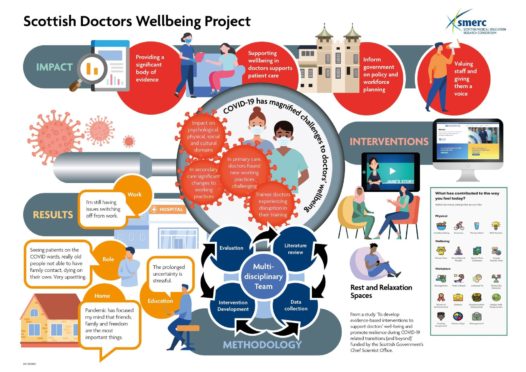Relaxation spaces and a new mobile app are among the suggestions made in the findings of a study designed to relieve pressure on NHS staff amidst the pandemic.
A £1 million grant to Aberdeen University to fund research into Covid has helped a Scotland-wide research group look closely at ways to improve the wellbeing of doctors and trainee medics.
Researchers looked at pages of diaries kept by 100 participants across all 14 regional health boards and carried out a series of interviews.
The findings of the university’s medical school and the Scottish Medical Education Research Consortium reveal doctors and trainee medics have been overwhelmingly negatively impacted by the pandemic.
But it’s £197,080 study is suggesting an interactive app, rest and relaxation spaces and informal, in-person psychological support, could be used to ease the stresses.
Dr Kim Walker from the Centre for Healthcare Research Education and Innovation (CHERI) headed-up the study.
She said: “The Covid-19 pandemic has magnified already existing challenges to doctors’ wellbeing and it is extremely important to give the workforce a voice, listen to what they are telling us and fundamentally take action to address their concerns.
“We know that in supporting wellbeing in doctors, we then in turn support patient care, so it is vital we do all we can to listen and act upon what we learn.”
Community and hospital-based specialties were included, with interviewees ranging from new graduates to retired doctors who had returned to practise in the pandemic.
The outcomes of the interviews were used to inform expert panels involved in developing action to make life easier.
Five interventions were prioritised for development as a result of the interviews, including the provision of rest and relaxation spaces for staff where they can take a moment and also eat and drink in an area exclusive to them.
There is also the roll out of the “How Was Your Day” app in which users rate how they feel throughout the day to help inform constructive changes to working practices.
Staff will also be actively encouraged to use the NHS National Wellbeing Hub.
Materials will also be produced highlighting the challenges and experiences faced by GPs working in the pandemic and there will be the offer of informal, in-person support from specially trained healthcare professionals.
Aberdeen University carried out the study alongside experts from medical schools at Dundee, Edinburgh, Glasgow and St Andrews universities, as well as NHS Education for Scotland, before reporting back – as part of the Rapid Research in Covid report – to the Chief Scientist Office, which awarded the £1 million to the university last May.
